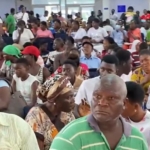
Thousands of parents and students have thronged the Ghana National Association of Teachers (GNAT) Hall in Accra, transforming the national resolution centre into a scene of anxious queues and frustrated appeals following the release of the 2025 Senior High School (SHS) placement results.
The rush comes as a staggering 107,509 Basic Education Certificate Examination (BECE) candidates—representing 18.2% of all qualified students—were not automatically placed into any of their chosen schools.
The Ministry of Education, through the Ghana Education Service (GES), announced the release of the results on Wednesday, September 17, with an official reporting date for students set for Saturday, October 18.
However, the initial relief has quickly turned into widespread frustration for many who find themselves with no placement or assigned to schools and programmes they did not select.
The GNAT Hall, designated as a national hub for resolving placement issues, has been the focal point of the distress.
Witnesses describe a scene of long, winding queues and a palpable sense of anxiety as parents and their wards navigate the complex self-placement process.
“I came here to change the school that the system gave to my son,” said Daniel Lartey, a parent who was among the crowd. “Since we got here, the queue has been just overwhelming. I wish he attended a school closer to us, and particularly, we want a day school.”
According to official figures from the Ministry of Education, a total of 603,328 candidates sat for the 2025 BECE. Of this number, 590,309 qualified for placement.
The Computerized School Selection and Placement System (CSSPS) successfully placed 483,800 students, accounting for 82% of the qualified candidates.
READ ALSO: Frustration at GNAT Hall as parents, students denied re-entry amid SHS placement rush
Among those placed, 248,038 (51.4%) are female. The remaining 107,509 students who missed out on automatic placement have been directed to the self-placement portal.
Dr. Clement Apaak, the Deputy Minister of Education, acknowledged the challenges but urged parents to exercise patience. “Not every student will get their first choice, especially in the top-tier schools where demand is high,” he said during a monitoring visit to the centre.
“But there are equally good schools available that can meet their educational needs. Our teams are on the ground to assist, and we are confident that the majority of cases will be resolved.” Dr. Apaak also noted that the October 18 reporting date was deliberately chosen to allow ample time for all outstanding issues to be addressed.
The issues being addressed at the GNAT Hall are varied, including students with mismatched genders (e.g., a boy placed in an all-girls school), students who were placed in an academic stream despite choosing a technical one, and general non-placement issues.
Frustrations also flared as some parents were denied re-entry to the hall after stepping out to print necessary documents.
Kofi Asare, the Executive Director of Africa Education Watch, provided a broader perspective on the situation.
Speaking on Citi FM, he explained that the issue is not a lack of capacity but a high demand for a limited number of popular schools.
“We have more spaces in schools than we actually need,” he stated. “But the issue is that while the country has spaces in our secondary schools, the spaces do not meet the full expectations, tastes, and choices of parents.”
As the queues at the GNAT Hall continue to grow, the coming days will be crucial for the thousands of families waiting for a resolution to secure their children’s educational future.
The Ministry of Education has cautioned against paying money to any third party who promises to secure a placement, reiterating that the placement process remains free.